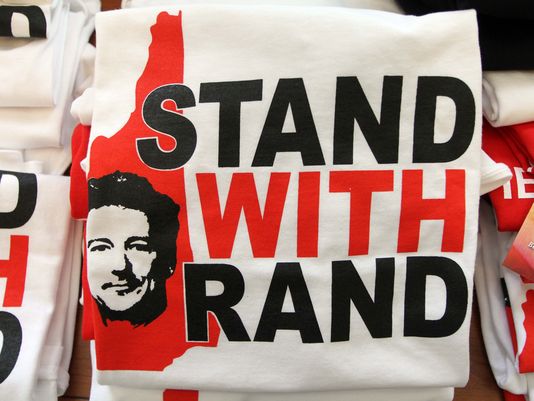Will the Tea Party go to Washington?
Senator Paul’s record in the senate has been unmatched in terms of fighting to advance economic freedom and personal liberty. His championing of fiscal issues has been matched and some might say overshadowed by his stances on civil liberty and constitutional due process. A filibuster against President Barack Obama‘s pick for CIA chief turned into a proxy war against the unconstitutional use of drones by the Executive Branch, rallying the nation behind him to #standwithrand. He has rallied the Republican base behind him in this effort, shifting the hawkish republican neoconservatism towards a more libertarian populism.
Senator Rand Paul is now the de facto leader of the Republican Party.
Although mainstream media pundits have been slow to warm to Paul, even neoconservative mainstays of the major networks have offered him glowing interviews. Traditional conservative types have come out in favor of privacy in the face of National Security leaks revealing the extent of their domestic spying programs. They have praised Paul for his fight for constitutional checks and balances and constitutional due process. It’s safe to say that this is due in large part to a Democratic president currently pulling the strings at the embattled spy agency. But still, this plays to the strength of Paul who can rally the true anti-war sentiment of his libertarian base with the more politically motivated stances of conservatives from now until 2016. There will still be a big problem waiting for Rand when the national security conservatives turn their guns on him, as many already have.
War with the Establishment
Tussles with high-profile political actors such as New Jersey Governor Chris Christie offer some insight into Rand Paul’s possible future political strategy. Whereas his father, former candidate and Congressman Ron Paul, had a much more professorial approach to campaigning, Rand looks as if he will be a scrapper taking shots at people like Christie and arch-neocon William Kristol. Refusing to back down from insults to his foreign policy, the younger Paul came off as credible to Christie’s blustering about how dangerous libertarianism is. The elder Paul would have been written off in the media as a crank, most likely due to his rather stilted way of speaking. Rand Paul can not be written off in the same way his father was.
Although the styles of the two Paul’s are very different, their policy prescriptions are very similar. Buzzfeed’s recent profile of Senator Paul’s fighting spirit shed more insight into this subject.
Sen. Rand Paul was in the middle of one of his trademark takedowns of the “right-wing hawks” in his party who “have never met a war they didn’t want to get involved in,” when he suddenly paused and began grinning.
“There was a funny article the other day in Mother Jones — did you see it? About one of my colleagues?” he asked.
He was trying to do the polite, senatorial thing by not mentioning his “colleague” by name. But when his vague prompt was met with a blank look during an interview with BuzzFeed, he scrapped the pretense of diplomacy and charged forward.
“It ranked the different countries on how eager Sen. [John] McCain wanted to be involved [militarily],” he explained, not even attempting to contain his amusement. “So, like, for getting involved in Syria, there’s five Angry McCains. For getting involved in the Sudan, there’s two Angry McCains. And there’s a little picture of him. You know, he was for getting involved to support [former Libyan president Muammar] Gaddafi before he was for overthrowing Gaddafi. He was for supporting [former Egyptian president Hosni] Mubarak before he was for supporting the Muslim Brotherhood before he was for supporting the generals.”
Not long ago, the Washington grown-ups who run the Republican Party would have dismissed the junior senator from Kentucky making cracks about an establishment pillar like McCain as little more than the goading of a gadfly. But over the past two weeks, it has become clear that Paul’s brand of Republicanism has spread deeply within his party. He successfully rallied a bipartisan coalition of lawmakers against a military intervention in Syria; thoroughly embarrassed Republican leaders who supported the air strikes; and temporarily elevated himself to the role of de facto foreign policy spokesman for the GOP. When President Obama took his case for war to the American people in a primetime address this week, it was Paul who delivered the unofficial Republican counterargument in a series of interviews and a widely covered speech.
Paul, in short, is winning.
New Coalitions
Rand Paul has been a powerful voice in championing non-intervention in the Syrian civil war. Despite allegations of the use of chemical weapons by the government of Assad, the American people have overwhelmingly stated their wish to stay out of the conflict and Paul’s popularity has been buoyed from public opinion.
Paul has become the de-facto center of that anti-war movement, rallying coalitions of progressive democrats and libertarian republicans to take stances against the administration’s hawkish foreign policy. If the president does not succeed in committing US resources to battle in Syria then Senator Paul will have played a major part of that. As Ronald Reagan was able to bring Democrats into his coalition, so Paul may be able to harness some of their votes due to his positions on civil liberties and war.
Paul also takes advantage in that early primary states have libertarian friendly coalitions embedded within, due to the process of local involvement engaged in by supporters of his father. Battles waged in caucus states for delegates left libertarians holding leadership positions in GOP committees. Those people could activate even earlier to help the Kentucky hopeful secure the nomination before other challengers could gain a foothold.
Paul’s greatest challenge
Paul’s greatest challenge to winning the presidency is not the GOP establishment however. If he were to win the nomination, Paul would most likely have to face Hillary Clinton at the ballot box. Clinton left office embattled by scandals surrounding the tragedy she presided over in Benghazi. But despite this, she still maintained significant public popularity. Rand Paul would have to face the entire power of the Democratic Clinton machine. No one in the GOP currently has a strategy that shows them beating Clinton, not even Paul.
She [Hillary Clinton] still leads all of the GOP hopefuls but in many of the cases it’s by tight margins- 1 point over Chris Christie at 43/42, 2 points over Paul Ryan at 46/44, 3 points over Jeb Bush at 44/41, 5 points over Marco Rubio at 45/40, and 8 points over Rand Paul at 47/39. Obviously it’s early but you can see a picture here that’s been painted in many key Senate races over the last two cycles- the person with the most support from Republicans is also the weakest general election candidate.

So Paul may be the first choice for Republicans, but he does the worst against Hillary Clinton. The GOP establishment will absolutely argue that the Kentucky senator is not “electable.” Still, nominating Mitt Romney in the last election was a failure on many levels that the Republican’s would do well not to repeat. One of the main reasons floated for supporting Romney’s candidacy was that he was that he was moderate and could win. But electability arguments made for his nomination didn’t actually translate into getting elected. Nominating Paul would show the country that even if the GOP must lose, it will lose on principle, rather than selling out to the most moderate candidate. Senator Barry Goldwater‘s famous losing campaign was a setback for the GOP, but it laid the seeds for the Reagan Revolution. Even worst case scenario, if the GOP nominates Paul they are demonstrating adherence to their stated principles. Voters could reward them for that.
There’s a danger in being a frontrunner as the senator might peak early, but at the moment it seems that his closest competitors, Christie and Rubio, are far behind. If the election were held today, Senator Rand Paul could be the next President of the United States.




1 comment
… [Trackback]
[…] Information on that Topic: thelibertarianrepublic.com/senator-rand-paul-next-president-united-states/ […]